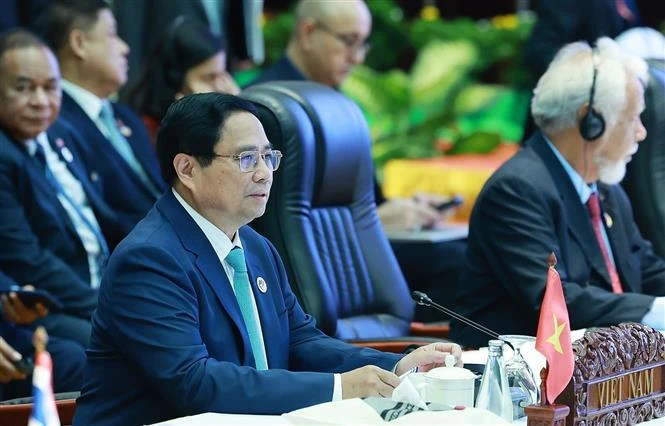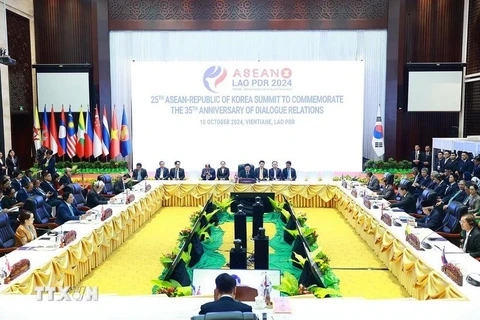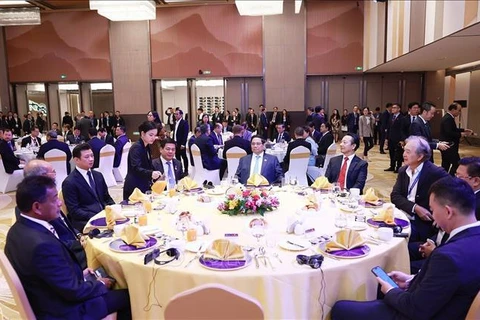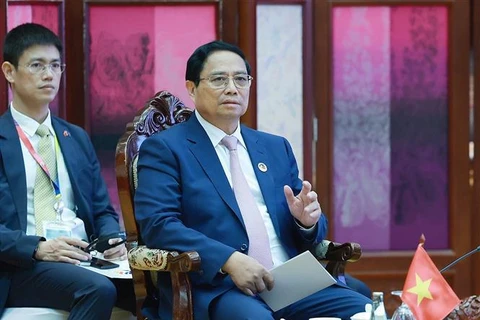
Vientiane (VNA) – Vietnamese Prime Minister Pham Minh Chinh attended the 27th ASEAN - China Summit and the 25th ASEAN - Republic of Korea Summit on October 10 in Vientiane, Laos, during which he called for closer connections between the bloc and its partners for peace, security, and sustainable development.
Speaking at the 27th ASEAN - China Summit, the Vietnamese leader welcomed the practical, effective and comprehensive development of ASEAN - China relations, which brings practical benefits to all parties. He stressed that the Association of Southeast Asian Nations (ASEAN) and China are increasingly affirming their roles as important drivers and dynamic centres for growth and development in the region and the world.
He emphasised the importance for ASEAN and China to improve self-reliance; and promote close, comprehensive, and inclusive connections by strengthening strategic connectivity, especially in strategic and transport infrastructure, fostering new growth drivers, ensuring smooth trade connectivity, connecting more closely with the “Belt and Road Initiative”, accelerating market opening, upgrading border infrastructure, while effectively taking advantage of scientific- technological achievements, and promoting cooperation in developing digital and green economy.
Highlighting the significance of the 2024 "ASEAN-China Year of People-to-People Exchanges", which includes many meaningful activities to help the two sides’ people better understand, share, trust, and connect with each other, PM Chinh urged the two sides to continue promoting connectivity and people-to-people exchanges, thus contributing to strengthening the solid social foundation, friendly neighbourliness and cooperation, as well as the Comprehensive Strategic Partnership between ASEAN and China.
He emphasised the need to promote a vision of peace and security, and to jointly shoulder the responsibility for maintaining a peaceful environment for cooperation and development, expressing his hope that ASEAN and China will align their stances and viewpoints; further enhance political trust; and work closely together to contribute positively and responsibly to peace, security, and stability.
The Vietnamese PM urged the two sides to increase dialogue and peaceful settlement of disputes in the region, including the East Sea, in a bid to turn the East Sea into a sea of peace, stability, cooperation, and sustainable development.
He also called for the early conclusion of negotiations on a practical and effective Code of Conduct in the East Sea (COC) in accordance with international law, including the 1982 United Nations Convention on the Law of the Sea (UNCLOS).
Leaders of ASEAN and China praised the positive and continuous progress in the ASEAN-China relations, particularly since the two sides established the Comprehensive Strategic Partnership in 2021. China has been ASEAN's largest trading partner for 15 consecutive years, with bilateral trade reaching nearly 700 billion USD in 2023, and it ranks as the third largest foreign investor in ASEAN with total investment of 17.3 billion USD.
They applauded the completion of negotiations to upgrade the ASEAN-China Free Trade Agreement (ACFTA) to version 3.0, which facilitates enhanced economic, trade, and investment cooperation and strengthens regional supply chains. They also emphasised the need to expand cooperation in science - technology, innovation, digital transformation, smart agriculture, energy, climate change response, and disaster management.
Chinese Premier Li Qiang affirmed the need to continue prioritising the development and enhancement of close connections between regional economies; effectively implementing the ACFTA and the Regional Comprehensive Economic Partnership (RCEP) Agreement; and promoting transport connectivity projects and multimodal transport to enhance trade, services, tourism, and people-to-people exchanges, thus bringing tangible benefits to the countries involved, and contributing positively to prosperity and development in the region and the world.
He also pledged to offer more scholarships for ASEAN students, promote people-to-people exchanges, and enhance mutual understanding and trust, which serve as an important foundation for the sustainable development of the ASEAN-China relations.
Regarding the East Sea issue, the ASEAN and Chinese leaders affirmed the importance of ensuring peace, security, and stability in the East Sea, and peacefully resolving disputes. They called for the full implementation of the Declaration on the Conduct of Parties in the East Sea (DOC), and the promotion of efforts to achieve the Code of Conduct (COC) soon, aiming to turn the East Sea into a sea of peace, friendship, and cooperation.
The ASEAN and Chinese leaders approved joint statements on deepening people-to-people exchanges, basically completing negotiations to upgrade the ACFTA, developing smart agriculture, promoting the development of sustainable and inclusive digital ecosystem, and combating online scams and gambling.

The 25th ASEAN - RoK Summit adopted the Joint Statement on establishing the ASEAN-RoK Comprehensive Strategic Partnership, marking a new milestone on the occasion of the 35th founding anniversary of the relations between the two sides (1989-2024).
The ASEAN and Korean leaders emphasised that the establishment of the Comprehensive Strategic Partnership demonstrates the close ties and the positive results of cooperation between ASEAN and the RoK.
The RoK is currently ASEAN's 5th largest trading partner, with two-way trade turnover reaching 196.64 billion USD and the 6th largest FDI investor in ASEAN reaching 11 billion USD in 2023.
The leaders affirmed to continue to closely coordinate to effectively implement the RoK-ASEAN Solidarity Initiative (KASI) to further deepen the bilateral cooperation. In addition to cooperation in responding to non-traditional security challenges, promoting trade, business connections, people-to-people exchanges, culture, education, and tourism, the two sides agreed to further promote cooperation in science, technology, innovation, digital transformation, environment, climate change response, and natural disaster management.
Korean President Yoon Suk Yeol praised the remarkable progress achieved in the ASEAN-RoK relations in all fields over the past 35 years, particularly the bilateral total trade turnover increased 23 times, investment increased 80 times and people-to-people exchange increased 37 times.
He affirmed that the RoK will continue to prioritise strengthening solidarity and cooperation with the ASEAN countries, effectively responding to and handling challenges related to security, economy, climate change, among others, while increasing resources for cooperation with ASEAN on smart cities, digital transformation, joint research, and technology and artificial intelligence human resource training.
Speaking at the event, PM Pham Minh Chinh expressed his delight to see ASEAN and the RoK officially establish the Comprehensive Strategic Partnership on the occasion of the 35th anniversary of their relations and Vietnam’s playing the role as the coordinator of the ASEAN-RoK relations (2021-2024).
The PM proposed three orientations to make the ASEAN-RoK relations commensurate with the new level.
First, he called on the RoK to contribute more responsibly to peace, security, stability and prosperity in the region. The Vietnamese leader welcomed the RoK's continued active support for ASEAN's common stance on the East Sea as well as efforts to build the East Sea into a sea of peace, stability, cooperation and sustainable development. ASEAN is ready to coordinate and encourage relevant parties to enhance dialogues, towards long-term peace and stability on the nuclear-free Korean Peninsula.
Second, ASEAN and the RoK should promote economic cooperation more strongly, focusing on economic connectivity, and cooperation in culture, tourism, education and training.
In particular, trade and investment cooperation needs to be developed in a more balanced and sustainable direction, making better use of the ASEAN-RoK Free Trade Agreement (AKFTA) and the Regional Comprehensive Economic Partnership Agreement (RCEP), while promoting the signing of joint documents, creating a transparent and favourable cooperation mechanism, opening larger markets for each other, promoting exchanges and cooperation in culture, tourism, and education and training.
Third, the two sides should take more drastic actions to promote inclusive, comprehensive growth and sustainable development, especially for new growth drivers. Accordingly, it is necessary to open doors for strategic cooperation areas, including innovation, high technology, renewable energy, digital transformation, green transition, climate change response, semiconductors, artificial intelligence (AI), cloud computing, and Internet of Things.
The two sides also need to continue promoting the Mekong-RoK Partnership, actively contributing to sub-regional development, ensuring inclusive growth, narrowing the development gap and ensuring equitable and sustainable development in the region./.






















